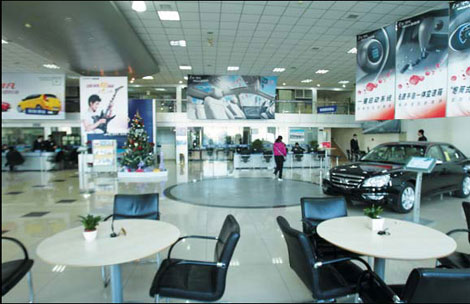Photos
Car dealers say Beijing auto rules hurt
Updated: 2011-01-04 14:08
By Wang Wen (China Daily)
|
 |
|
A quiet car dealership in Gaobeidian, Chaoyang district, on Dec 24. [Photo / China Daily] |
With Beijing's new traffic policies in operation and people swamping an official website to try to snag coveted approval to buy a car through the new lottery system, car dealers have seen a sharp fall in business.
There was a rush to snap up a car during the weeks before the new rules came into effect but the 10 days since then have been quiet.
Zhang Jicheng, a manger at a Peugeot dealership near the North Fifth Ring Road, said they have had ample supply of new autos but a shortage of customers since Dec 23 when the new rules came in.
"We haven't seen local customers coming in during the past 10 days," Zhang told METRO.
He said the dealership ran out of cars in the days before Dec 23.
And he said hundreds of inquiries came in that night and his staff stayed up all night dealing with contracts.
The website of the license-plate lottery system has been working since Jan 1 and offices in 16 districts will open to enhance that online system today.
People wanting to buy a car must now apply for permission either online or at the 16 offices.
Those eligible to buy a vehicle will then participate in a lottery each month. The first lottery is set for Jan 26.
The Mirror Evening News reported that by 11 am on Jan 2, a total of 60,000 people had applied to take part in the lottery.
Those taking part in the lottery are only a tip of the iceberg. The lottery is not open to people who do not have a Beijing hukou. Residents without one used to be the largest group of car buyers in the capital.
Under the new rules, they will only be able to join the lottery if they can provide proof that they have paid social security and personal income tax for five consecutive years in the city.
"As many as 80 percent of our consumers used to be non-locals who want to get a local plate. They do not have the opportunity any more," said Wang Baocheng, a salesman from a vehicle store in the Beijing Yayuncun Vehicle Market, which is the largest such market in the city.
Wang, who sells Hummers, said they lost 80 percent of their potential consumers during the past 10 days.
He said about 30 percent of domestic brands have already withdrawn from the vehicle market and he thinks many more will follow.
The strategy of vehicle manufacturers and dealerships will be changed in 2011 because of the new regulations, Wang predicted.
| ||||
Zhang Jicheng, the manger of the Peugeot store, said the whole industry may change the way it does business this year, away from stockpiling large inventories of cars.
"We will purchase vehicles from manufacturers according to our orders, instead of stocking up our showrooms," he said.
According to the Beijing Municipal Statistics Bureau, more than 95,000 new vehicles were sold in the city in November, which was 30,000 more than the average number during the previous 10 months.
Meanwhile, about 900 residents have already posted questions about the car-buying lottery on the official website and received answers from the traffic authority.
Most questions focus on who is qualified to take part in the lottery while others ask about such things as what to do with cars already in their possession.
"I have two cars now and wonder whether I can give one to my daughter?" asked a netizen named Ma Rui.
"According to the regulations, your daughter needs to participate in the lottery and get her license first," came the reply.
Some people also asked questions about the new rules on the Peace Beijing micro blog that is run by the city's police department.
E-paper

Ear We Go
China and the world set to embrace the merciful, peaceful year of rabbit
Preview of the coming issue
Carrefour finds the going tough in China
Maid to Order
Specials

Mysteries written in blood
Historical records and Caucasian features of locals suggest link with Roman Empire.

Winning Charm
Coastal Yantai banks on little things that matter to grow

New rules to hit property market
The State Council launched a new round of measures to rein in property prices.




